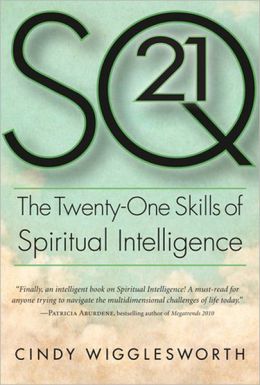Reviewed by Michael Winters, PhD
 Of what does the human spirit consist? Can spiritual development be measured? Is it possible to intentionally develop human spirit? These questions are fundamental to a new book by Houstonian, Cindy Wigglesworth. The book – SQ21: The Twenty-one Skills of Spiritual Intelligence explores not only the measurement, but also the development of spiritual skills.
Of what does the human spirit consist? Can spiritual development be measured? Is it possible to intentionally develop human spirit? These questions are fundamental to a new book by Houstonian, Cindy Wigglesworth. The book – SQ21: The Twenty-one Skills of Spiritual Intelligence explores not only the measurement, but also the development of spiritual skills.
Initially I was skeptical that spirituality could be defined in concrete behavioral terms. But the more I read, the more I realized that careful definition, and measurement are possible and essential to marrying the spiritual and the scientific realms. In addition to bringing spiritual understanding and growth into the sphere of the psychological, SQ21 also demystifies religious dogma that insists that a particular path must be followed to spiritual growth (i.e., the rules of a particular religion). Instead SQ21 asks what are the spiritually enlightened humans of many different traditions like – how do they think, comprehend the world and act in the world? By analyzing enlightened humans we have goals for spiritual development.
Wigglesworth also took the developing psychology of intelligences as a model for her work. Specifically she saw that emotional intelligence is more complex than cognitive intelligence, but grew out of measurement of cognitive intelligence. Spiritual intelligence is, likewise, more complex that emotional intelligence – but can serve as a model for understanding ways to measure transcendent skills.
The first part of the book examines the idea of spiritual intelligence and outlines Wigglesworth’s approach to measuring spiritual intelligence. Wigglesworth was not the first to write about spiritual intelligence, but is the first to bring it into the field of science. Using psychological models of defining a concept to be measured, careful item development and statistical analysis of the assessment, Wigglesworth has created a scientifically valid, consistent and reliable instrument.
The second part of the book examines the skills she has identified. She breaks the skills into quadrants. Quadrant 1 – Self awareness, Quadrant 2 – Awareness of the world, Quadrant 3 self-mastery, and Quadrant 4 social mastery and spiritual presence. Self awareness includes exploration of: Who am I in the world, what are my values, and “who is driving my life (ego or higher self)? The skills of the second quadrant are about awareness of the world. Wigglesworth blends multicultural awareness into this section, along with understanding of the interconnectedness of life, the limits of human perception and awareness of transcendent consciousness. In quadrant 3 and 4 Wigglesworth moves from awareness to applied skills. Abilities such as: sustaining faith, living your purpose and values, making wise and compassionate decisions are covered in this section. The first two parts of the book alone would be a sufficient contribution to the literature, but Wigglesworth adds a third.
Part three presents ideas for developing spiritual intelligence. This section has many ideas and exercises, but among the most profound is the simplest – the idea that the “Higher Self” and the “Ego” compete for personal energy. Developmentally humans start with ego – ego is concerned with survival and meeting immediate needs, so – it is easy to return to ego energy. But it is possible to move beyond the ego to one’s higher self. The higher self is concerned about self and others, and about more than mere survival. Learning to identify when ego is in charge and working to move energy and consciousness to the higher self underlie the development process.
Wigglesworth admits that this book is not the final answer on understanding and developing spirituality. And it is not, but it has made bold steps in developing a vocabulary of spiritual skills, in measuring these skills, and offering ideas about how to develop the skills. Anyone interested in spiritual development will find SQ 21 highly stimulating.
Michael Winters is a Psychologist in Houston focusing on marriage counseling and therapy. Michael received his PhD from the University of Memphis and has been practicing since 1991.

